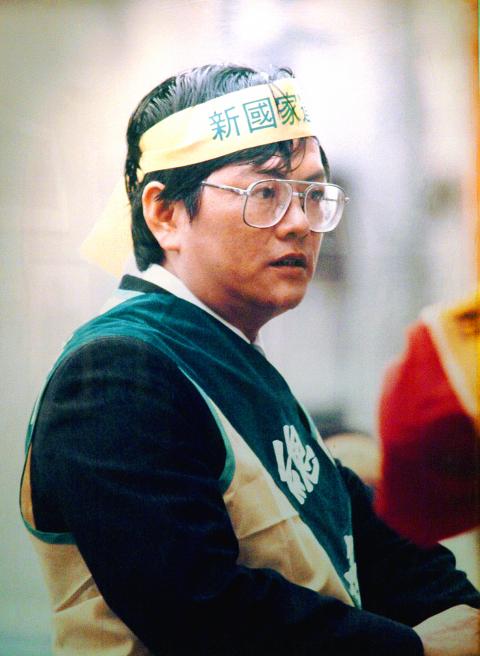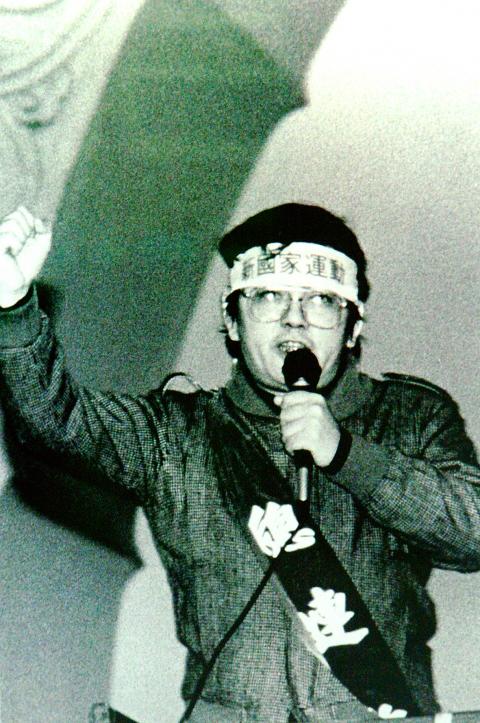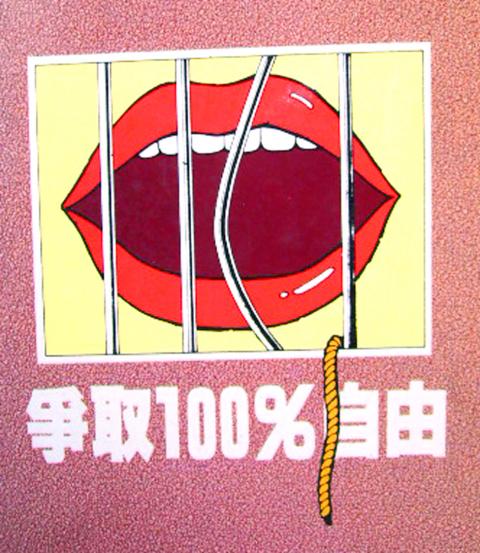Taiwan in Time: April 4 to April 10
Deng Nan-jung’s (鄭南榕) magazine had 18 licenses, 22 publication names and was shut down by the government 44 times over five years — but it always hit the shelves on time. But this time, they got him.
On April 7, 1989, armed police broke their way into the office of Freedom Era Weekly (自由時代) on Minquan E Road (民權東路) in Taipei. Amid the confusion, Deng, who had barricaded himself in the building for the previous 71 days, slipped into his private office, where he had stored three cans of gasoline and a lighter.

Photo courtesy of Deng Liberty Foundation
By the time someone noticed, Deng had already locked the door from inside and set the room on fire. He did not survive.
He earned many monikers in the media aftermath: “madman,” “martyr,” “lone ranger,” and “the weirdo from the philosophy department,” courtesy of United Evening News (聯合晚報).
The mission of Deng’s magazine was to “fight for 100 percent freedom of speech.” Today, the street where it happened is officially named Freedom Lane (自由巷) and in December last year, Taipei Mayor Ko Wen-je (柯文哲) designated April 7 Freedom of Speech Day.

Photo courtesy of Deng Liberty Foundation
Deng was well-known by the government as an outspoken democracy activist who claimed he had no fear of arrest or death. From the day he publicly declared his support for Taiwanese independence during a speech at Jinhua Junior High in Taipei, he would keep testing the government’s limits.
He finally committed the ultimate political taboo by publishing a draft of the constitution for a Republic of Taiwan in its entirety on Dec. 10, 1988, Human Rights Day. Penned by Japan-based independence activist Koh Se-kai (許世楷), the first article called for a free, independent Taiwan, “made up of people who have decided to recognize Taiwan as their motherland for eternity.”
Even though martial law had been lifted the previous year, it was still a crime to advocate “splitting the country’s territory.” The ruling Republic of China government’s claim on both Taiwan and China was not to be questioned, and publishing the draft was the ultimate call for freedom of speech, which Deng considered the “most basic right in a democracy” and something that needs to be fought for even when “facing the barrel of a gun.”

Photo courtesy of Deng Liberty Foundation
Deng did not found the magazine until 1984 at age 37, but his rebellious side could be seen early, as he is said to not have graduated from college because he refused to take a course on Sun Yat-sen (孫逸仙) thought.
The magazine often ran negative articles about president Chiang Ching-kuo (蔣經國), criticized martial law as well as repeatedly brought up taboo subjects under martial law such as the 228 Incident. It serialized Henry Liu’s (劉宜良) unauthorized biography on Chiang after the writer was murdered, allegedly under government orders. The “100 percent freedom of speech” mission was printed on every cover.
Ho Chien-ming (何建銘) writes in the study Freedom Era Weekly and Taiwanese Democracy Movements in the Late 1980s (自由時代系列雜誌與1980後期台灣民主運動) that Deng was one of the few activist magazine publishers who also organized events. Deng was one of the masterminds behind the Green Movement protests on May 19, 1986, calling for the lifting of martial law on the 36th anniversary of its declaration, as well as the first 228 Incident march on the event’s 40th anniversary.
In 1987, Deng made his famous (or infamous) declaration, which historian Hu Hui-ling (胡慧玲) writes in the Taiwan Historical Society’s (台灣歷史學會) Window on Taiwan (台灣之窗) column that it was the first time someone dared to publicly do so in Taiwan.
In November that year, Deng reportedly slapped legislator Chu Kao-cheng (朱高正) in the face after Chu tried to stop him from distributing independence pamphlets at the Democratic Progressive Party’s second national meeting.
After he received the court summons for sedition in January 1989, Deng announced that he would not be captured alive and barricaded himself in the magazine’s office. The site is now the Deng Nan-jung Memorial Museum, and a section of the office remains as it was after the blaze.
Deng was not the only person who self-immolated, during this time. Just a month later during his funeral, activist Chan I-hua (詹益華) also set himself on fire in front of the Presidential Office.
The magazine survived Deng’s death, with his brother at the helm until it closed due to financial troubles in November 1989.
Taiwan in Time, a column about Taiwan’s history that is published every Sunday, spotlights important or interesting events around the nation that have anniversaries this week.

One of the biggest sore spots in Taiwan’s historical friendship with the US came in 1979 when US president Jimmy Carter broke off formal diplomatic relations with Taiwan’s Republic of China (ROC) government so that the US could establish relations with the People’s Republic of China (PRC). Taiwan’s derecognition came purely at China’s insistence, and the US took the deal. Retired American diplomat John Tkacik, who for almost decade surrounding that schism, from 1974 to 1982, worked in embassies in Taipei and Beijing and at the Taiwan Desk in Washington DC, recently argued in the Taipei Times that “President Carter’s derecognition

This year will go down in the history books. Taiwan faces enormous turmoil and uncertainty in the coming months. Which political parties are in a good position to handle big changes? All of the main parties are beset with challenges. Taking stock, this column examined the Taiwan People’s Party (TPP) (“Huang Kuo-chang’s choking the life out of the TPP,” May 28, page 12), the Democratic Progressive Party (DPP) (“Challenges amid choppy waters for the DPP,” June 14, page 12) and the Chinese Nationalist Party (KMT) (“KMT struggles to seize opportunities as ‘interesting times’ loom,” June 20, page 11). Times like these can

Dr. Y. Tony Yang, Associate Dean of Health Policy and Population Science at George Washington University, argued last week in a piece for the Taipei Times about former president Ma Ying-jeou (馬英九) leading a student delegation to the People’s Republic of China (PRC) that, “The real question is not whether Ma’s visit helps or hurts Taiwan — it is why Taiwan lacks a sophisticated, multi-track approach to one of the most complex geopolitical relationships in the world” (“Ma’s Visit, DPP’s Blind Spot,” June 18, page 8). Yang contends that the Democratic Progressive Party (DPP) has a blind spot: “By treating any

You can tell a lot about a generation from the contents of their cool box: nowadays the barbecue ice bucket is likely to be filled with hard seltzers, non-alcoholic beers and fluorescent BuzzBallz — a particular favorite among Gen Z. Two decades ago, it was WKD, Bacardi Breezers and the odd Smirnoff Ice bobbing in a puddle of melted ice. And while nostalgia may have brought back some alcopops, the new wave of ready-to-drink (RTD) options look and taste noticeably different. It is not just the drinks that have changed, but drinking habits too, driven in part by more health-conscious consumers and